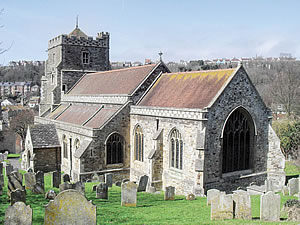Hastings Concert Series - The Twenty Second Series
May 21-24 2010

Peter Cox Smith reports
The 2010 programme opened with change – a newly refurbished church and a new first concert recitalist – the latter a far from newcomer to Hastings, however; in the shape of Gordon Stewart, who also used the occasion to launch a new recording of the renowned 1878 Willis.
Entitled 'A song of sunshine' and including the composition of that name by Hollins, the recital on July 12th was clearly directed at a seaside evening audience mixed with local organ enthusiasts. A broadly baroque first half commenced with JS Bach’s Toccata and Fugue in D minor BWV 565 and Jesu, Joy of Man’s Desiring – Bach in his best-known form for this type of concert, and an interesting arrangement of the chorale with full chords on the Great rather than the music’s usual solo melodic adaptation. The following Buxtehude Prelude, Fugue and Chaconne with its initial pedal solo and the delightful Handel Cuckoo and the Nightingale Concerto provided a well-thought-out contrast to the ever popular introductions and together the Bach arrangement of Ernst’s Concerto in G maintained the keen appreciation of an exceptionally large audience. As ever, the sheer quality of the Willis voicing, superbly demonstrated by the recitalist, was evident throughout with sonorous diapason tone and flutes that have a distinctive resonance and individual 'chiff'.
A contrasting second session, again mixing popularity with originality, commenced with the Ley arrangement of Purcell’s Trumpet Tune and Air and progressed through Elgar (his Salut d’amour with poignant Swell and Choir solo reeds), Aston’s Homage to Gabriel Fauré, the aforementioned Hollins to a stirring finale of the Allegro symphonique from Salome. Not often heard, this was an ideal conclusion to broaden horizons and provide encouragement to sample the wider repertoire. If the very substantial numbers looking to purchase the CD were an indication, this opening offering was another notable success, particularly in attracting a greater non-specialist audience.
Monday July 19 saw the return of Peter Wright from Southwark Cathedral, with a contrasting programme aimed at the more serious organ fraternity. The Fanfare from Lemmens, with its distinctive arpeggios and use of Great and Swell reeds provided an impressive precursor to the Purcell Voluntary on the 100th Psalm with a dominant lower octave great tromba. In modern parlance, this register multi-tasks with voicing combining trumpet tune ability together with chorus reed capability and the aforementioned lower octave power, of particular use when coupled in the absence of a pedal reed. Buxtehude’s Praeludium and Fugue in F sharp minor followed, with the pedal open wood prominent in the flowing movements of the finale. Prélude funèbre from Guy Ropartz and the seven-part Partita sopra 'Nun reut euch' by Lionel Rogg completed an interestingly played first session.
Post interval, a lightly-registered JS Bach BWV 547 C major Prelude and Fugue was well received by a knowledgeable audience and led to a superb finale, of Flor Peeters' Choral Prelude 'Gott, du frommer Gott' with Swell strings quietly echoing in the generous acoustics, the 'thunderous' Michael Corrette composition and Jongen’s Sonata Eroica – demanding the greatest accuracy with its opening octaves and flourishes. The use of a telephone directory on the lowest pedal octave to effect thunder during the Corrette caused some interest, courtesy of the video screen, now a permanent feature of the series. The Jongen remains, in the view of the writer, an outstanding piece and an excellent conclusion to a technically powerful recital.
Erstwhile All Saints resident organist Richard Eldridge returned on the 26th to entertain a faithful and very substantial gathering with his jovial and highly informative style. The Festival Voluntary of Flor Peeters, with its immediate modern impact, caught the attention, to be followed by a Bach quartet, comprising the BWV 545 C major Prelude and Fugue and the chorale preludes 'Liebster Jesu, wir sind hier' , 'Ich ruft zir dir, Herr Jesus Christ' and 'Wachet Auf, ruft uns die Stimme'. To add further interest, the basic chorale tune was played before each of the preludes and this extra feature certainly gave a further dimension to a first half that proceeded with the Finale from Guilmant’s First Sonata and ended with a premiere performance of Philip Homes’s Annwyn, written for the performer. All well presented and well performed by a gifted local musician, the delicate use of beautiful Willis flutes in the chorale preludes being particularly memorable.
The complete overture to Handel's Occasional Oratorio, with a rich Swell oboe solo mid section prior to its exhilarating finale, was an effective choice prior to a 'peculiar' inclusion, in the word of the performer, of John McCabe's Nocturne with its rather bizarre use of reeds. Clearly not for everyone, but certainly different. More conventional use of the great tromba came with the Grand March from Aida and, unsurprisingly, led to a Lefébure-Wély finish to include the E flat Sortie, something of an Eldridge local signature tune. An excellent evening, with a delightful touch of informality.
